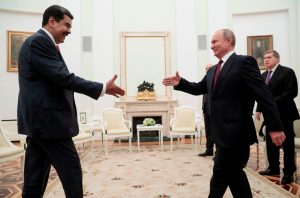Although Russian meddling in the U.S. election is a popular topic covered by U.S. media, Russian influence campaigns in other countries and regions are covered less frequently in the mainstream media. However, this recent New York Times article, “As Protests in South America Surged, So Did Russian Trolls on Twitter, U.S. Finds,” sheds light on the extent of Russian social media campaigns in Latin America. The U.S. State Department routinely monitors social media worldwide, especially Twitter, to watch for evidence of malicious activities sponsored by foreign governments with the purpose to influence public opinion. In the case of Latin America, accounts flagged by the State Department as being backed by the Russian government have ramped up efforts to sow dissent and confusion throughout this past fall as protests have erupted across many of the countries in the region. Specifically, most of the tweets are aimed at increasing support for the Maduro government in Venezuela, which is funded in part by Russian oil and backed politically by the Russian government, in states where many people have demanded Maduro’s resignation. The United States along with a coalition of over 50 other states have backed Juan Guaidó, the opposition leader in Venezuela, and have imposed sanctions on the Maduro regime. Therefore, Russian meddling in the region appears to be specifically aimed at disrupting the support and influence in Venezuela and Latin America overall of the U.S. and its allies.

The article went on to provide evidence of the Russian Twitter campaigns beyond just Venezuela, stating that almost 10% of all tweets in Chile supporting the protests last fall came from Twitter accounts flagged by the U.S. State Department as having a “high certainty of being linked to Russia” (Jakes). Furthermore, in Bolivia, in the period before and after President Morales resigned, tweets about Bolivia in the Russian Twitter network surged from about five per day to over a thousand. While these campaigns are not necessarily related to Russian interests in Venezuela, they are still working to increase Russian influence in Latin America by trying to garner support for Russian-backed governments in the region. Besides Twitter, the Spanish-language branches of Russian news organizations such as RT Español and Sputnik Mundo have been accused of spreading “disinformation, conspiracy theories, and in some cases, outright falsehoods” in order to garner support for Russian-backed causes (Jakes).
The Russian foreign minister has denied any government involvement in the Twitter campaigns. Plus, even the general public in Chile was skeptical of how much foreign involvement could be influencing protests after the Chilean government released a report citing foreign actors as playing a “leading role” in inciting protests (Jakes). Furthermore, it is also still unclear how effective these Russian Twitter campaigns have been in changing public opinion to support Russian-backed causes. The State Department was unable to concretely prove that these Twitter accounts were directly backed by the Russian government, instead describing them as “likely linked to the Russian state” (Jakes). Even with the pushback against the State Department’s claims, however, this remains an incredibly important geopolitical issue, highlighting the continued influence of post-Cold War U.S.-Russian relations across the world and the growing prevalence of Russian meddling in states’ internal affairs through the use of social media.
This article does a good job of showing Latin America not as a region apart from the rest of the world but as one intricately connected. Additionally, it shows just how much influence the major powers still have or try to have in the region even though we are theoretically living in a post-colonial, post-Cold War society. This article does still fall into the trope of depicting Latin American states as unstable and susceptible to outside control, but this is necessary to provide the background knowledge on why Russian influence campaigns are suddenly so abundant in the region.
This also relates to the themes we’ve been discussing in the class. Chasteen discusses in Ch. 5 how, since the end of the independence movements in Latin America, governments in the area have often been unstable and tend to be overturned quickly, which is still continuing to occur today. This article also ties back into the major themes of nationalism versus liberalism in Latin American politics. There has been conflict since the end of colonization about whether countries should strive for the support of outside actors like the U.S. and other world powers or remain focused internally for growth and support. The effect of these two ideologies can still be seen in the way that countries like Venezuela have partnered closely with Russia while others are trying to avoid external influence on national politics.
The article by Jeifets, Khadorich, and Leksyutina helps to further explain why Russia is working so hard to garner Latin American support right now. The authors explain how, after the West imposed sanctions on Russia for their actions in Ukraine, Russia has focused heavily on finding new trade opportunities outside of Europe. Of relations with Latin American states, Russian-Venezuelan relations have historically been the strongest due to their heavy reliance on oil as a key export. In return for diplomatic support for Russian foreign policy with Ukraine, Crimea, and Georgia, Russia has also supported and helped fund the Venezuelan military. With the global dip in oil prices, however, and the continued rise of China in Latin America, Russia appears to be starting to lose its influence in Venezuela and in Latin America as a whole, leading towards its new strategy of social media meddling.
References:
Chasteen, John Charles. Born in Blood & Fire: a Concise History of Latin America. 4th ed., W.W. Norton & Company, 2016.
Jakes, Lara. “As Protests in South America Surged, So Did Russian Trolls on Twitter, U.S. Finds.” The New York Times, 20 Jan. 2020, https://www.nytimes.com/2020/01/19/us/politics/south-america-russian-twitter.html?searchResultPosition=2
Jeifets, Victor, et al. “Russia and Latin America: Renewal versus Continuity.” Portuguese Journal of Science, vol. 17, no. 2, 2018, pp. 213–228., http://content.ebscohost.com/ContentServer.asp?T=P&P=AN&K=132485541&S=R&D=aph&EbscoContent=dGJyMMvl7ESeqLU4yNfsOLCmsEieqLFSsK64SrCWxWXS&ContentCustomer=dGJyMPGqsEyxqbNRuePfgeyx44Dt6fIA.
Leave a Reply